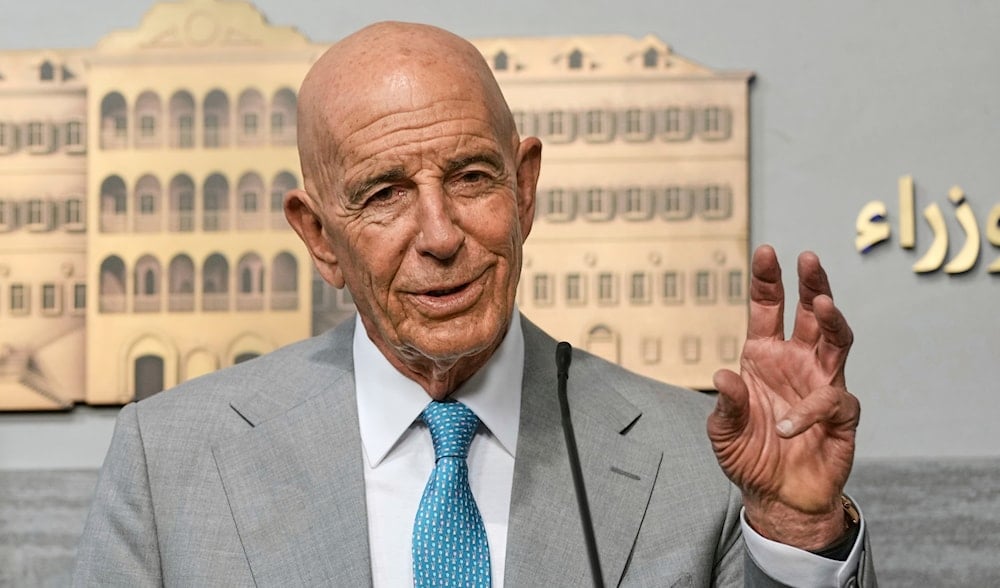Barrack backs Damascus, suggests 'Israel' prefers a divided Syria: AP
US envoy Tom Barrack says there's "no Plan B" for Syria, warns Israeli strikes complicate efforts as Sweida clashes and Kurdish talks continue.
-

U.S. Ambassador to Turkey and Special Envoy to Syria Tom Barrack speaks during a press conference after meeting with Lebanese Prime Minister Nawaf Salam at the government palace in Beirut, Lebanon, July 21, 2025 (AP)
The US envoy to Syria reaffirmed Washington's commitment to the newly established Syrian interim government, emphasizing that there is “no Plan B” to engaging with the current authorities in Damascus. The statement came amid escalating sectarian violence in southern Syria and an intervention by “Israel” that has further complicated regional dynamics.
Tom Barrack, who serves as the US ambassador to Turkey and special envoy to Syria, made the comments during a visit to Beirut. He also holds a temporary mandate in Lebanon.
Speaking to the Associated Press, Barrack addressed the recent clashes in Sweida, the implications of “Israel’s” strikes, and efforts to stabilize Syria after nearly 14 years of conflict.
Barrack defended Washington’s engagement with the Syrian authorities, describing them as a “nascent government” dealing with a complex post-conflict landscape. “The killing, the revenge, the massacres on both sides” are “intolerable,” he said, but alleged that the Syrian government is doing what it can “with very few resources” to rebuild a fractured society.
However, it is worth noting that the Syrian security forces have been accused of carrying out field executions, looting civilian homes, and harming the residents of Sweida.
At a later press conference, he stressed that while Washington supports the new transitional government, it also believes the authorities “need to be held accountable” for any violations, including abuses in the recent Sweida clashes.
Israeli strikes on Syria criticized
Barrack took a somewhat critical stance on “Israel’s” recent intervention in Syria, calling the strikes “poorly timed” and uncoordinated. “The United States was not asked, nor did they participate in that decision,” he said. “Nor was it the United States responsibility in matters that Israel feels is for its own self-defense.”
The envoy warned that the strikes, which targeted Syrian government convoys and the Ministry of Defense in Damascus, introduced “another very confusing chapter” into an already volatile situation. He announced a limited ceasefire agreement over the weekend between Syria and “Israel”, covering only the province of Sweida.
Barrack suggested that “Israel” may be uncomfortable with a strong centralized Syrian state. “Strong nation states are a threat, especially Arab states are viewed as a threat to Israel,” he stated. He added that Syria’s diverse communities “are smart enough to say, we’re better off together, centralized.”
He also noted that before the Sweida conflict, Syria and “Israel” had engaged in security talks with encouragement from the Trump administration toward normalization, discussions now frozen.
Kurdish talks continue despite violence
Despite the unrest in Sweida, negotiations between Damascus and Kurdish-led forces in the northeast continue. The interim Syrian government is attempting to integrate the US-backed Syrian Democratic Forces (SDF) into a unified national army.
Barrack, who spoke with SDF leader Mazloum Abdi over the weekend, expressed optimism. “I don’t think this will derail the process. I think there could be a breakthrough in the coming weeks,” he said.
As the situation evolves, neighboring Turkey has offered military support to Syria, particularly as Kurdish influence remains a point of tension along its border. Barrack said the US “has no position” on a possible defense pact between Syria and Turkey, reiterating that Washington is “not in the business” of telling sovereign nations how to manage regional security arrangements.
Read more: Top Turkish, Syrian diplomats discuss situation in Syria: Reports
On Lebanon
During his visit to Lebanon, Barrack addressed the lingering issue of Hezbollah’s disarmament. While the US has pushed for the group to relinquish its weapons following its recent war with “Israel,” he labeled the issue as an "internal" matter.
“The ceasefire agreement didn’t work,” he said, referring to the November truce between Hezbollah and the Israeli occupation. Despite the ceasefire, “Israel” continues near-daily airstrikes in southern Lebanon, killing civilians and destroying southern infrastructure.
Meanwhile, Hezbollah reiterates it will not disarm until “Israel” halts its attacks and withdraws from Lebanese territory, to which Barrack claimed the US has “no whip” and “can’t compel Israel to do anything”.
Read more: Lebanon finalizes response to US on 'disarmament calls': Exclusive

 4 Min Read
4 Min Read








